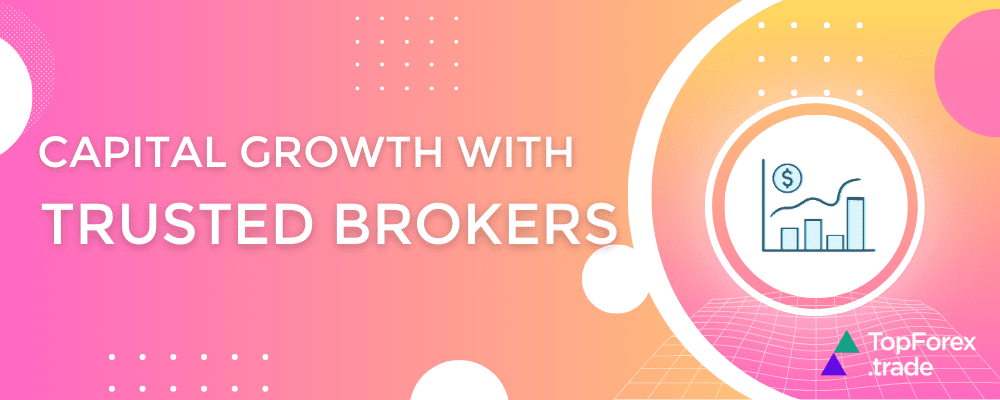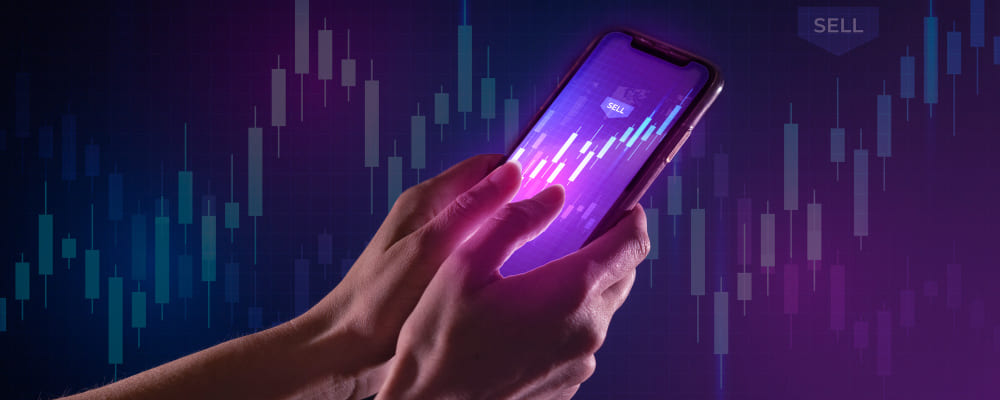Capital growth strategies with regulated brokers

Financial planning is a crucial aspect of success for traders navigating financial markets’ dynamic and often unpredictable world. Whether you’re a seasoned professional or just starting, having a solid financial plan can mean the difference between thriving and merely surviving in the trading arena.
At its core, financial planning for traders involves strategizing how to effectively manage income, expenses, and investments to achieve specific financial goals. Setting clear goals and establishing a budget are two fundamental components of this process, serving as the guiding principles that shape a trader’s path to financial success.
- Setting goals: One of the first steps in financial planning for traders is defining clear and achievable financial goals. These goals act as the roadmap that guides trading decisions and helps traders stay focused amidst the inherent volatility of the markets. Whether aiming for a certain level of profitability, building an emergency fund, or saving for retirement, setting goals provides traders with a sense of direction and purpose in their financial journey.
- Budgeting: Equally important to setting goals is the establishment of a comprehensive budget. Budgeting allows traders to track income and expenses, identify areas where they can optimize their finances, and ensure that they effectively allocate resources toward their financial goals. By creating a budget tailored to their unique trading circumstances, traders can maintain financial discipline, mitigate risks, and ultimately enhance their long-term financial stability.
In essence, financial planning serves as the cornerstone of success for traders, providing them with the tools and strategies needed to navigate the complexities of the financial markets and achieve their desired outcomes. By setting clear goals and implementing effective budgeting practices, traders can empower themselves to make informed decisions, manage risks, and ultimately realize their full potential in the world of trading.
How to set the right trading goals

Setting clear, measurable, and achievable financial goals is paramount for traders looking to navigate the complexities of the financial markets and achieve long-term success. These goals provide a sense of direction, focus, and motivation, guiding traders through the ups and downs of trading while keeping their eyes on the ultimate prize. Here’s why setting financial goals is essential:
- Clear goals provide clarity and focus, helping traders stay on track amidst market volatility and uncertainty.
- Measurable goals allow traders to track their progress and make necessary adjustments to their trading strategies.
- Achievable goals are realistic and within reach, motivating traders to strive for success without feeling overwhelmed or discouraged.
Short-term, medium-term, and long-term financial goals
- Short-term goals: These are typically goals that traders aim to achieve within a relatively short timeframe, usually within weeks or months. Examples include hitting a certain weekly profit target, covering monthly trading expenses, or learning a new trading strategy.
- Medium-term goals: These goals span a timeframe of several months to a few years and often involve more significant milestones. Examples include building an emergency fund equivalent to six months’ worth of living expenses, achieving consistent profitability over a year, or expanding the trading portfolio to include diverse asset classes.
- Long-term goals: These are the big-picture objectives that traders aspire to achieve over an extended period, typically spanning several years or even decades. Examples include saving for retirement, reaching a specific net worth milestone, or achieving financial independence through trading.
Examples of common financial goals for traders
- Achieving a certain level of profitability: Traders may set goals to achieve a specific percentage return on investment (ROI) within a given timeframe, aiming to consistently grow their trading capital.
- Building an emergency fund: Establishing an emergency fund is crucial for traders to weather unexpected financial setbacks or market downturns without jeopardizing their trading activities.
- Saving for retirement: Planning for retirement is essential for traders to secure their financial future and maintain their desired standard of living beyond their trading years. This may involve contributing to retirement accounts such as IRAs or Solo 401(k)s and investing in long-term growth opportunities.
Setting clear, measurable, and achievable financial goals is a foundational step in the financial planning process for traders. By delineating short-term, medium-term, and long-term goals and aligning them with their aspirations and risk tolerance, traders can chart a path to success in the dynamic world of trading while maximizing their long-term financial well-being.
How to determine your trading risk tolerance

Risk tolerance is a critical concept in trading and investing, representing an individual’s willingness and ability to endure fluctuations in the value of their investments. Understanding one’s risk tolerance is crucial to making informed trading decisions and constructing a portfolio that aligns with their financial goals and psychological comfort level.
Risk tolerance refers to an individual’s capacity to handle the potential loss of investment capital without experiencing significant emotional distress or financial hardship. In trading, risk tolerance plays a pivotal role in determining the appropriate level of risk that traders are willing to assume in pursuit of their financial objectives.
Traders with a higher risk tolerance may be more inclined to engage in aggressive trading strategies that offer the potential for higher returns but also entail greater volatility and potential losses. Conversely, traders with a lower risk tolerance may prefer more conservative strategies that prioritize capital preservation and steady, albeit potentially lower, returns.
Common methods for assessing risk tolerance are:
- Questionnaires: Many financial institutions and online brokerage platforms offer risk tolerance questionnaires designed to assess an individual’s comfort level with various levels of risk and volatility. These questionnaires typically ask about factors such as investment goals, time horizon, financial situation, and attitude toward risk.
- Self-assessment: Traders can also conduct a self-assessment of their risk tolerance by reflecting on their past experiences with investing, their emotional responses to market fluctuations, and their financial goals and constraints. Self-awareness and honest introspection are key to accurately gauging one’s risk tolerance.
Once traders have assessed their risk tolerance, it’s essential to align it with their financial goals and trading objectives. Traders with a higher risk tolerance may feel comfortable pursuing aggressive trading strategies aimed at maximizing returns, such as day trading or investing in high-risk/high-reward assets like penny stocks or cryptocurrencies.
Traders with a lower risk tolerance may opt for more conservative trading approaches, focusing on capital preservation and steady, sustainable growth. They may prioritize investments in less volatile assets such as blue-chip stocks, bonds, or index funds.
Regardless of risk tolerance, traders must diversify their portfolios across different asset classes and maintain a balanced risk-reward profile that reflects their individual preferences, goals, and time horizons.
How to manage your trading capital

Trading capital refers to the financial resources that traders allocate to their trading activities, including funds used to execute trades, cover margin requirements, and withstand potential losses. Effectively managing trading capital is essential for traders to survive and thrive in the dynamic and often unpredictable world of financial markets.
Trading capital serves as the lifeblood of a trader’s operations, providing the necessary funds to enter and exit positions, withstand market fluctuations, and capitalize on profitable opportunities.
Unlike traditional investments, where capital preservation is typically prioritized, trading involves the active deployment of capital to generate returns through buying and selling financial instruments such as stocks, currencies, commodities, or derivatives. Proper management of trading capital is crucial for traders to protect against excessive losses, maintain liquidity, and sustain their trading activities over the long term.
Common strategies for preserving trading capital
- Position sizing and risk management
Position sizing involves determining the appropriate amount of capital to allocate to each trade based on factors such as risk tolerance, account size, and the probability of success.
Risk management techniques, such as setting stop-loss orders and limiting the size of individual trades as a percentage of total capital, help mitigate the impact of adverse market movements and prevent catastrophic losses.
- Diversification of asset classes
Diversifying trading strategies allows traders to spread risk across different approaches, such as trend following, mean reversion, or breakout trading, thereby reducing reliance on any single strategy.
Similarly, diversifying across asset classes (e.g., equities, commodities, and currencies) helps spread risk and enhance portfolio resilience, especially during periods of market turbulence or sector-specific downturns.
- Setting stop-loss levels
Setting stop-loss levels is a fundamental risk management practice that defines the maximum acceptable loss on a trade before exiting the position. Adhering to risk management rules, including predetermined risk-reward ratios and maximum loss thresholds per trade or day, helps maintain discipline and prevent emotional decision-making driven by fear or greed.
Top Forex brokers with the best trading conditions
In the competitive landscape of trading, selecting a reliable broker is pivotal for effective capital management and trading success. The brokers mentioned below have earned reputations for offering trusted trading services, providing a range of features and tools designed to empower traders in managing, trading, and increasing their trading capital.
XTB trading review
XTB provides traders with access to a diverse array of global markets, spanning Forex, indices, commodities, Cryptocurrencies, and more. With a wide range of XTB tradable assets, traders can diversify their portfolios and seize opportunities across different asset classes and geographical regions.
XTB offers sophisticated trading platforms equipped with advanced charting tools, technical indicators, and risk management features. Traders can leverage these tools to conduct in-depth analysis, identify trading opportunities, and execute trades with precision, enhancing their chances of success in the markets.
The broker is committed to offering competitive pricing and low trading costs to its clients. With tight spreads, minimal commissions, and transparent pricing structures, traders can maximize their trading capital and optimize their profitability while keeping transaction costs to a minimum.
XTB provides comprehensive educational resources, including webinars, tutorials, and market analysis, to support traders in improving their trading skills and staying informed about market developments. Additionally, XTB offers dedicated customer support to assist traders with any questions or issues they may encounter along their trading journey.
In conclusion, XTB offers traders a comprehensive suite of tools and features to enhance their trading experience and optimize their trading strategies. From access to diverse financial markets to advanced trading platforms and low-cost trading options, XTB is committed to empowering traders to succeed in the dynamic world of trading. If you’re ready to elevate your trading game and maximize your trading capital, we invite you to open an account with XTB using the link below and start benefiting from their trusted services and innovative solutions. Take the first step towards achieving your financial goals with XTB today.
Exness trading review
Exness is a regulated broker that offers traders access to a wide range of global markets, including Forex, commodities, indices, and Cryptocurrencies. With an expansive selection of tradable assets, traders can diversify their portfolios and capitalize on opportunities across various asset classes and regions.
Exness provides advanced trading platforms equipped with powerful analytical tools, technical indicators, and risk management features. Traders can utilize these tools to conduct thorough market analysis, make informed trading decisions, and execute trades efficiently, maximizing their potential for success in the markets.
Moreover, the broker is known for its low-cost trading environment, offering competitive spreads, minimal commissions, and transparent pricing structures. By keeping trading costs low, Exness enables traders to preserve more of their trading capital and enhance their overall profitability.
Exness excels in providing high-speed execution and reliable order execution, ensuring that traders can enter and exit positions swiftly without delays or slippage. With lightning-fast execution speeds, traders can execute their trading strategies with precision and confidence, minimizing trading risks and optimizing trading outcomes.
The broker’s platform has a wide range of educational resources, including trading guides, video tutorials, and market analysis, to support traders in honing their trading skills and staying updated on market developments. Additionally, Exness provides dedicated customer support to assist traders with any inquiries or assistance they may need throughout their trading journey.
Take your trading to the next level and unlock your full potential by opening an account with Exness using the link below. Start your trading journey with Exness today and experience the difference trusted services and innovative solutions can make in achieving your financial goals.
OANDA trading review
OANDA is an all-about-currency broker that grants traders entry to an expansive array of CFDs encompassing currencies, commodities, indices, bonds, and precious metals. This diverse offering empowers traders with the flexibility to diversify their portfolios, enabling them to seize opportunities across various market segments and capitalize on emerging trends.
As for OANDA trading platforms, it furnishes traders with cutting-edge solutions that are not only intuitive but also feature-rich, equipped with robust analytical tools. With access to real-time market data, customizable charting options, and seamless execution capabilities, traders can conduct trades efficiently and make informed decisions, thereby maximizing their potential for success in the markets.
Moreover, OANDA boasts a comprehensive suite of risk management tools aimed at assisting traders in mitigating potential losses and safeguarding their trading capital. From the implementation of stop-loss orders and take-profit orders to the utilization of trailing stops and guaranteed stop-loss orders, OANDA empowers traders to manage risk effectively, instilling confidence even in volatile market conditions.
In addition, OANDA offers a wealth of educational resources, market analysis, and research tools to support traders throughout their trading journey. From informative articles and engaging webinars to insightful market commentary and in-depth analysis, OANDA equips traders with the knowledge and insights they need to make well-informed trading decisions and stay abreast of market developments.
By partnering with OANDA, you’ll gain access to trusted services, innovative solutions, and a supportive trading environment that can help you unlock your full potential as a trader. Start your trading journey with OANDA today and embark on the path to trading success.
NAGA Markets trading review
NAGA Markets provides traders with a gateway to diverse financial markets, offering access to a wide spectrum of financial instruments, including Forex, stocks, indices, Cryptocurrencies, and commodities. With this extensive array of tradable assets, traders have the flexibility to diversify their portfolios, enabling them to capitalize on opportunities across various asset classes and CFD markets.
Moreover, NAGA Markets equips traders with advanced trading platforms that boast user-friendly interfaces, feature-rich functionalities, and cutting-edge technology. With access to real-time market data, advanced charting tools, and seamless execution capabilities, traders can execute trades efficiently and navigate the markets with confidence.
Additionally, NAGA Markets offers a unique Social trading platform that facilitates connections between traders and experienced investors. Through this innovative feature, traders can follow successful investors, replicate their trades, and potentially increase their trading capital through passive income generation. This eliminates the need for active trading or extensive market analysis, making trading more accessible and lucrative for traders.
Furthermore, NAGA Markets provides traders with a wealth of educational resources, including tutorials, webinars, and market analysis, to support their trading journey. Whether you’re a novice trader or an experienced investor, NAGA equips you with the knowledge and tools you need to succeed in the financial markets.
By partnering with brokers like OANDA and NAGA Markets, traders gain access to trusted trading services and innovative features that can help them effectively manage, trade, and increase their trading capital. Whether through active trading on OANDA’s advanced platforms or passive income generation via NAGA’s social trading platform, traders have access to a wealth of resources and opportunities to achieve their financial goals in the dynamic world of trading.
Related articles:
Trading capital management tips from leading FX brokers - FAQ